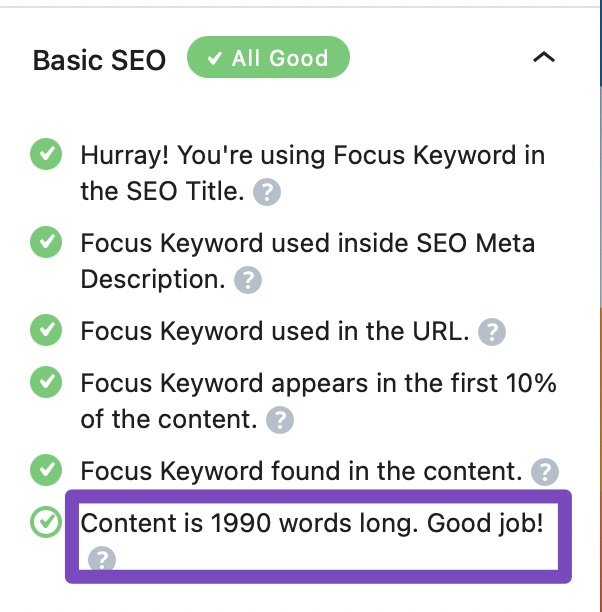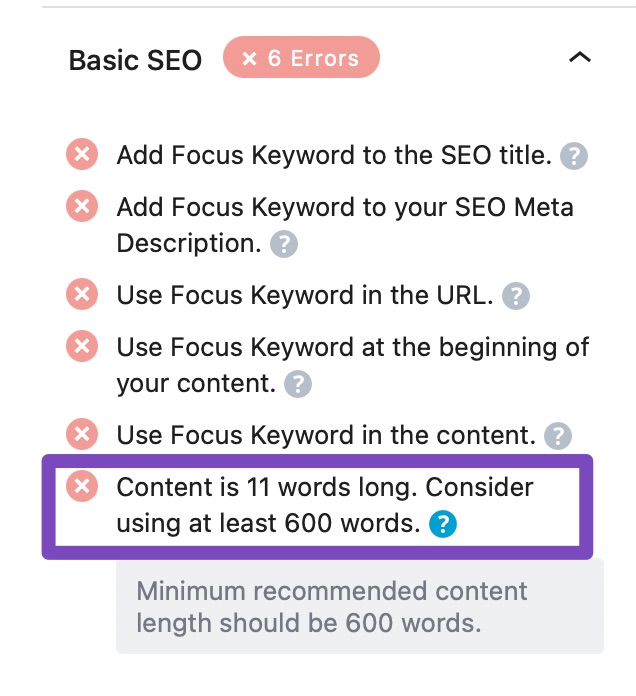We are sure that questions like “What do you think is the perfect length for a blog post? How long should my blog posts be?” come up frequently in your SEO & content marketing strategy.
For writers who are trying to build their audience online and trying to build organic traffic, it’s essential to learn how to write great blog posts. So let’s tackle the question – how long a blog post should be and how the Rank Math plugin helps you to achieve this.
Rank Math SEO’s content analysis checks the text length of your post. For regular posts or pages, we recommend writing a minimum of 600 words. This applies to all pages, including the About, Service, and landing pages. Why is that? There’s certainly a nugget of truth in here.
Although this is not to suggest that all posts that are longer are more helpful, it’s simply that content that is longer tends to also be more helpful to the end-user, in this case, the searcher.
However, we don’t recommend adding content unnecessarily just for the sake of it. Always aim to deliver quality content over quantity content.
Does the Word Count of Your Post or Page Really Matter?
Yes, the word count of your post/page really matters for Google ranking. Do you know why? If you write long posts and include more words in your content, then your chances of ranking on Google are high. However, the content length is not the only ranking factor for your website. There are various other ranking factors that you need to take care of and keep your content look fresh and authentic.
If your post is longer than 1000 words, then you can add more headlines, links, and images and deliver high-quality information through your post. Rank Math plugin has made all of this easier and helps you to increase your overall traffic.
Also, if a page consists of few words, Google is more likely to consider it as thin content. Each and every search engine aims at delivering the best answers to the audience’s queries. Thin content does not completely satisfy the audience as it does not provide complete answers to the queries, and hence the chances of ranking are not very high.
Longer content will also help you to rank higher for long-tail keywords that you’ve optimized your post for. Your posts that take a deep-dive into the content have a high probability to turn up in search results even for the long-tail keywords. If you smartly optimize your post, then you can easily boost the traffic and drive more organic traffic to your website.
How Does Rank Math SEO Help?
1 The Length of the Text
With the help of Rank Math SEO, you can easily check the length of your texts. You can find it in the General tab of Rank Math SEO. It determines how many words you’ve added to a page.

2 Not Enough Words in Content
In the Basic SEO analysis of Rank Math, you will see a similar check. Rank Math SEO will give you feedback with a red or orange bullet point if your post or page consists of less than 600 words. Rank Math SEO plugin requires a minimum number of words in order to evaluate the readability of your content. If the word count is less than 600 words, it won’t be able to give you the best results.

While longer blog posts tend to perform the best, that’s not to say that every single blog post you publish must be more than 2,000 words. If you feel you’ve covered the topic well enough in 800, or 1,000 words, then so be it.
3 Suggestion by Content AI

Rank Math’s Content AI analyzes existing search results for the target keyword and suggests the best word count based on your content and other factors. With this feature, you can see whether the word count is optimum or falls short. It is not mandatory to meet the exact word count suggested by Content AI. But, we all know that a long article or blog post always works best. If you can expand your web content with additional and relevant information, then it can provide a great user experience and a reduction in bounce rate.
Finally, we just want to say that though the word limit is crucial for Google as well as for SEO, it is not the only factor that will determine your site ranking on Google’s SERPs. Also, don’t ignore the word count entirely. Produce content at least between 700 and 800 words and make it qualitative content.
And, that’s it! If you still have absolutely any questions, please feel free to reach our support team directly from here, and we’re always here to help.